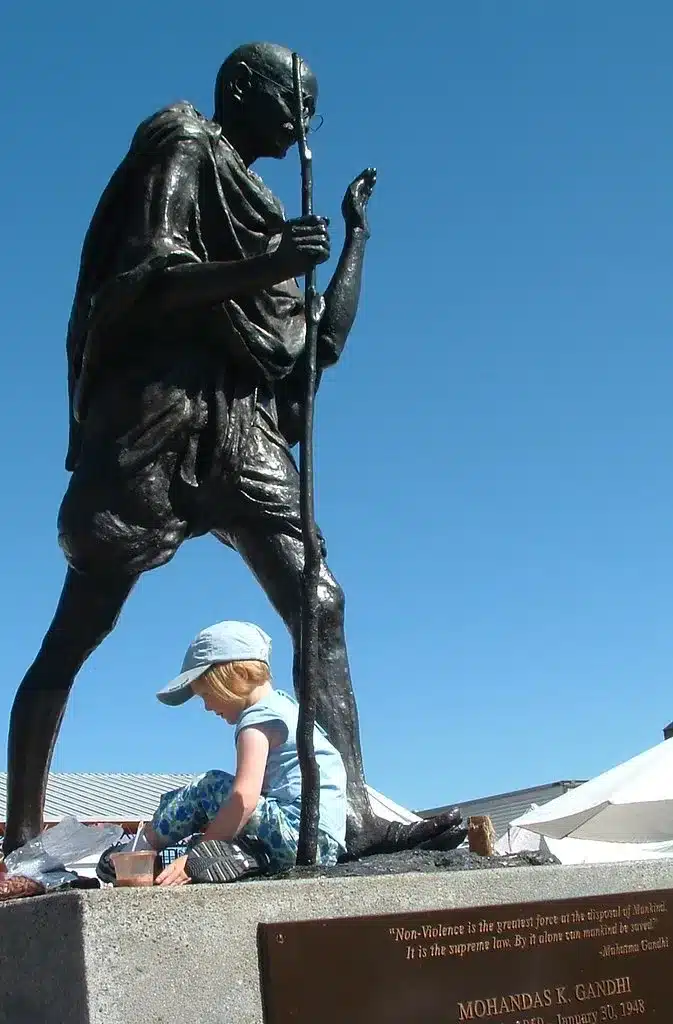“Gandhi” by joeandkaty is licensed under CC BY-SA 2.0
During my school days, I had always come across one piece of text. It was on the first page of every NCERT textbook. It is printed like any other text. So, I read those like any other text without realizing the intent meaning, and thoughts behind those texts. These were the thoughts of our Pujya Bapu, Mahatma Gandhi. It goes as follows:
“I will give you a talisman. Whenever you are in doubt, or when the self becomes too much with you, apply the following test. Recall the face of the poorest and the weakest man [woman] whom you may have seen, and ask yourself, if the step you contemplate is going to be of any use to him [her]. Will he [she] gain anything by it? Will it restore him [her] to control over his [her] own life and destiny? In other words, will it lead to swaraj [freedom] for the hungry and spiritually starving millions? Then you will find your doubts and yourself melt away.”
As the cycle of time went on teaching the precious learnings of the planet, the talisman is found like a shining star for mankind. These texts are not merely texts but the epitome of the collective happiness of mankind. It acts as a key to the soul of humanity. It holds immense value and provides a searchlight in the darkest hour of a moral dilemma for any human.
If one has a life of extreme indulgence on the top and down on the floor someone is going through extreme indigence which defies the dignity of human’s life, the situation falls in the category of wretchedness.
Laugh together
Mahatma Gandhi also known as Mohan Das Karamchand Gandhi envisioned a world where everyone regardless of their caste, creed, color, gender, or any kind of differentiation must enjoy life and time on the planet. It was the dream of the Pujya Bapu. Its reflection is vividly seen in the Talisman where he calls for any action taken by any human should have thought: How does it affect the life of someone who is deprived? This request for thought is resting on a firm foundation and humanity grows collectively. If one has a life of extreme indulgence on the top and down on the floor someone is going through extreme indigence which defies the dignity of human life, the situation falls in the category of wretchedness. For a moment, indulgence may appear pleasant, but in reality, humanity loses its strength. Strength lies in holding the hand of any and all who are lagging behind and moving together with a greater height. Laughing is more enjoyable if many more are there to share the laughter.
Humility and care at the core
Mahatma Gandhi received the teachings of Vaishnavism during their childhood from their family. His family worshipped Lord Vishnu and believed in the value of peace. It also embodies the belief that life in any form is equal. In his book “My Experiments with Truth” he remarked, “According to Christianity only human beings had souls, and not other living beings, for whom death meant complete extinction, while I held a contrary belief.” This teaching and innate belief played a role in shaping him for the future. He had accepted that path of non-violence with great confidence. The political leader encouraged people to fast and meditate. He regarded the purification of self as an essential thing.
“Vaishnava Jana To”, a Hindu bhajan, was written in the 15th century by the poet Narsinh Mehta in the Gujarati language. The poem speaks about the life, ideals, and mentality of a Vaishnava Jana. It was rendered in the Sabarmati Ashram and, ironically, found much closer than the Bapu than the poet.
Vaishnava Jan To, Tene Kahiye Je
Peed Paraayi Jaane Re,
Para Duhkhe Upakāra Kare To Ye
Mana Abhimāna Na Āane Re
The Bhajan means Vaishnava people understand and feel the pain of others. At the same time, lend his or her hand to help and support others and despite their intention and action of helping others, humility remains at the core of their heart.
Personal Freedom on the Decline in World: Human Freedom Index 2020
Freedom is the core of human development
Mahatma Gandhi in his talisman asks for thought when the self becomes too much. He asks to recall the face of the poorest and seeks an answer to the question: Will it help him or her to restore control over their own life and destiny? In other words, will it lead to swaraj for the hungry and spiritually starving millions? He had considered control over life and destiny synonymous with swaraj [Freedom].
Freedom of association, expression, and organization were three essential freedoms in public life. which were regarded by Gandhi as the breath, food, and drink of public life. On the national plane, he fought for regaining these three freedoms. Any restriction on these was unpardonable to him. Hence these freedoms restricted the sphere of state activity and created an unapproachable area of action for the individuals. Freedom was a value-laden concept in the Gandhian framework as he viewed freedom as dharma. Dharma, the higher moral law of life, should be protected even at the cost of living.

